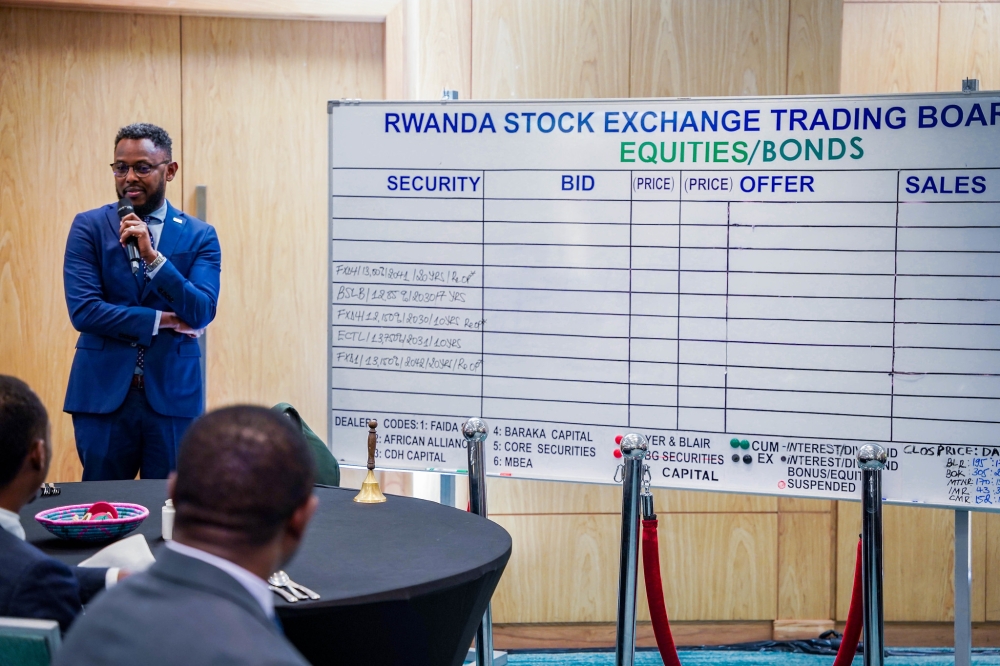Rwanda will start allowing the listing of exchange-traded funds and real estate investment trusts.


Industry players have said that the introduction of exchange traded funds (ETFs) and real estate investment trusts (REITs) will bring diversification to the Rwandan financial markets and provide investors with more options.
This follows the announcement by the Rwanda Stock Exchange (RSE) this week that it received approval from the Capital Market Authority (CMA) to introduce new listing rules for ETFs and REITs.
ETFs are investment funds traded on a stock exchange and allows an investor to buy a small portion of assets that the fund holds. These assets range from stocks, bonds and commodities, while the funds also aim to track a specific index or sector.
On the other hand, REIT is a collective investment vehicle that provides investors with a way to invest in large-scale, income-generating real estate, without needing to directly manage, finance or own the properties.
ALSO READ: Rwanda bourse to allow trading of new asset classes
There are three types of REITs, including development real estate investment trusts (D-REITs), income real estate investment trusts (I-REITs) and islamic real estate trusts, which adhere to Islamic principles.
D-REITs allow investors to pool their capital together to acquire real estate for development, while I-REITs allow investors to pool their capital together for purposes of acquiring long-term income-generating real estate.
"The introduction of these asset classes is timely because the Rwandan market has reached a stage where it is ready for diversification. Our investor base is growing rapidly and requires a broader range of investment options to meet their needs,” Thapelo Tsheole, the Chief Executive Officer of CMA told the New Times
ALSO READ: Rwanda Stock Exchange sees increased activity in H1 2024
He added that the rules governing the listing of ETFs and REITs are critical for maintaining the integrity of the market.
Market diversification
Apart from diversifying the market, industry players say that the new asset classes could increase market liquidity.
Bob Karina, the CEO of Faida Securities, a brokerage firm, said that the introduction of these financial instruments will enhance market liquidity, provide investors with more options for asset allocation, and attract both local and foreign investments.
"ETFs, for example, would allow any creative player to create a basket of instruments and an ecosystem to provide liquidity,” he noted.
While Rwanda&039;s stock market has been described as nascent, it has experienced significant development since its establishment in 2011 as more investors evolve from the traditional brick and mortar investments to embrace securities and bonds.
But given its size, is the market really ripe for the introduction of ETFs and REITs?
"Significant infrastructure, regulatory frameworks, and investor education will be necessary to ensure the successful launch and operation of ETFs and REITs,” Karina said, adding that the creation of the Kigali International Financial Center (KIFC) will have to play a key role, as more professionals and services emerge as a result of the center.
ALSO READ: Capital markets: Rwanda’s trading activities dip by 22.7 per cent
For Tsheole, investor education will be key to help drive uptake of the new asset classes.
"We are enhancing the ongoing investor education through various channels to foster a better understanding of these new asset classes. We are optimistic that, through our educational initiatives, we will attract a greater number of investors to engage in our market," he said.
Investor appetite is also likely to be driven by other factors including the potential for attractive returns as well as the country's overall economic growth.
These new asset classes are expected to attract retail investors seeking diversification as well as institutional investors such as banks, pension funds, and insurance companies among others. The ETFs and REITs could also attract foreign investors chasing yields and looking for opportunities in emerging markets.
All investments involve some level of risk, with potential high yielding assets carrying greater risk than assets with low or modest returns.
How risky are ETFs and REITs?
According to Karina, ETFs are subject to market fluctuations and the performance of the underlying assets, while REITs can be affected by real estate market conditions, interest rate changes, and economic factors.
"However, these asset classes are relatively less risky than many other instruments as they target a diverse pool of instruments,” he said.


